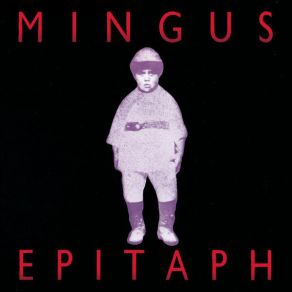Epitaph
Download links and information about Epitaph by Charles Mingus. This album was released in 1990 and it belongs to Jazz, Avant Garde Jazz genres. It contains 19 tracks with total duration of 02:07:08 minutes.

|
|
|---|---|
| Artist: | Charles Mingus |
| Release date: | 1990 |
| Genre: | Jazz, Avant Garde Jazz |
| Tracks: | 19 |
| Duration: | 02:07:08 |
| Buy it NOW at: | |
| Buy on iTunes $16.99 | |
| Buy on Amazon $7.59 | |
| Buy on Amazon $16.99 | |
| Buy on Songswave €3.58 | |
| Buy on Songswave €2.05 | |
| Buy on Songswave €1.53 | |
Tracks
[Edit]| No. | Title | Length |
|---|---|---|
| 1. | Main | 7:08 |
| 2. | Percussion Discussion | 8:36 |
| 3. | Main Score, Pt. 2 | 5:07 |
| 4. | Started Melody | 11:54 |
| 5. | Better Get It In Your Soul | 9:07 |
| 6. | The Soul | 3:19 |
| 7. | Moods In Mambo | 4:15 |
| 8. | Self Portrait / Chill of Death | 11:27 |
| 9. | Oscar Pettiford | 2:03 |
| 10. | Please Don't Come Back from the Moon | 9:49 |
| 11. | Monk, Bunk & Vice Versa (Osmotin') | 3:05 |
| 12. | Peggy's Blue Skylight | 4:35 |
| 13. | Wolverine Blues | 6:12 |
| 14. | The Children's Hour of Dream | 9:08 |
| 15. | Ballad (In Other Words, I Am Three) | 9:42 |
| 16. | Freedom | 7:03 |
| 17. | Interlude (The Underdog Rising) | 5:25 |
| 18. | Noon Night | 4:27 |
| 19. | Main Score Reprise | 4:46 |
Details
[Edit]Musicologist/conductor Gunther Schuller discovered and restored this massive, 130-minute work by the late bassist, then presented it in concert in New York in 1989. Scored for 30-piece jazz orchestra, Epitaph is thought by Schuller to have been worked on between 1940 and 1962. Amazingly enough, six of the players specified in the score appear on this recording. Some of the sections are familiar to Charles Mingus fans from small-band recordings, particularly "Better Get It in Your Soul," "Monk, Bunk, & Vice Versa (Osmotin')," and "Peggy's Blue Skylight," and there was an attempt to record this work for United Artists in 1962. Schuller makes a case for this work as a unified, 18-movement work in his extensive notes to this set. There is definite evidence that this is how Mingus himself thought of it as well. There is plenty of great big-band writing here, and some fine soloists, notably Bobby Watson, Randy Brecker, George Adams, and Wynton Marsalis. Schuller says it best in his notes: "This recording, while not the perfect realization of Epitaph — can that ever be achieved? — is an enthusiastic, dedicated, loving recreation, which now at last brings Mingus' magnum opus to life." With luck, this release will send people back to his many excellent recordings.